Bringing a second dog into your home, especially when you already have a Shiba Inu, is a decision that requires careful consideration. While the idea of two furry friends playing together harmoniously is appealing, the reality can be more complex. The goal of finding the Best Companion Dog For Shiba Inu is to introduce a compatible canine that enhances, rather than disrupts, your household’s harmony and your existing dog’s well-being. This guide delves into what makes a dog a good fit for a Shiba Inu, focusing on temperament, size, and energy levels, to help you make an informed choice.
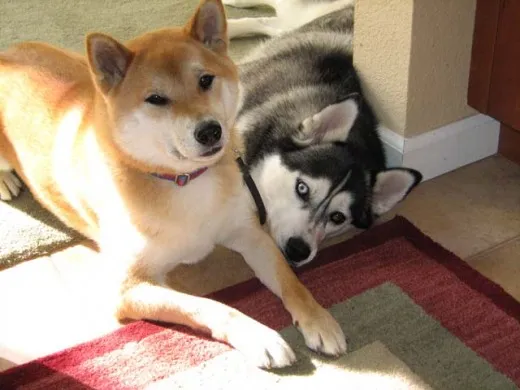 Shiba Inu and Siberian Husky lying next to each other. They are best friends.
Shiba Inu and Siberian Husky lying next to each other. They are best friends.
Understanding Your Shiba Inu’s Needs
Before seeking a companion, it’s crucial to understand the unique traits of a Shiba Inu. Shibas are known for their independent, bold, and sometimes stubborn nature. They possess a high prey drive, are intelligent, and can be quite possessive. Their energy levels are moderate to high, and they often enjoy interactive play but also appreciate their downtime. A key aspect to consider is their temperament around other dogs; while some Shibas are social, others can be dominant or wary. Therefore, the best companion dog for Shiba Inu needs to be one that can navigate these characteristics without exacerbating any potential issues.
When to Introduce a Second Dog
It’s generally advised to wait until your first dog, in this case, your Shiba Inu, is well-established in your home and has received proper obedience training. This means having good control over their behavior and addressing any existing behavioral issues. Introducing a second dog when your Shiba is already well-behaved and confident will create a more stable environment for both animals. Rushing this process can lead to amplified behavioral problems and stress for the entire family. Consider the financial and time commitment involved, especially if the new dog requires special care, similar to cases where dogs need amputation. Having a solid foundation with your Shiba Inu makes managing a new addition much more feasible.
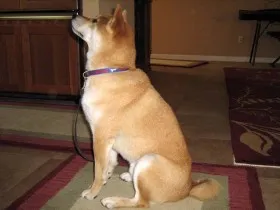 Shiba Inu doing a sit (side view shot). Reward training.
Shiba Inu doing a sit (side view shot). Reward training.
How to Choose the Best Companion Dog for Shiba Inu
Selecting the right breed and individual dog is paramount. It’s not just about breed stereotypes; individual temperament plays a significant role.
1. Size Considerations
While Shibas are a medium-sized breed, their play style can sometimes be overwhelming for smaller dogs. Conversely, a very large, boisterous dog might also present challenges. Observing your Shiba Inu’s play preferences is key. Does your Shiba enjoy roughhousing with dogs of similar size or larger, or do they prefer gentler interactions? The best companion dog for Shiba Inu in terms of size would ideally be one that your Shiba can comfortably and safely play with. For example, if your Shiba enjoys wrestling, a slightly larger or similarly sized dog with a robust build might be a good match, rather than a delicate small breed that could be easily injured.
2. Temperament Match
This is arguably the most critical factor. The best companion dog for Shiba Inu should have a temperament that complements, rather than clashes with, your Shiba’s personality.
- Submissiveness vs. Dominance: Shibas can be strong-willed. A highly dominant new dog might lead to power struggles and conflicts. A more submissive or equally confident but not overly assertive dog often works best.
- Energy Levels: While a Shiba has moderate to high energy, a companion with a slightly lower or equal energy level might be ideal. A dog with excessively high energy could amplify your Shiba’s exuberance, leading to hyperactive and potentially destructive behavior. Conversely, a dog that is too low-energy might not engage your Shiba sufficiently.
- Affection and Independence: Shibas can be aloof. A dog that is affectionate and enjoys human interaction can balance this out. Breeds known for being people-oriented can also encourage your Shiba to engage more socially.
- Play Style: Observe how your Shiba plays. Do they enjoy chasing, wrestling, or more gentle games? The new dog should ideally enjoy a similar play style or be adaptable enough to learn. For instance, if your Shiba is food-motivated and enjoys obedience, a dog that is also food-driven can make training sessions more engaging for both.
The Siberian Husky, for example, is mentioned as a good companion to a Shiba Inu because of its affectionate nature and lower protective drive, which can balance out a Shiba’s aloofness and watchfulness. This breed complementation helps them avoid amplifying each other’s less desirable traits.
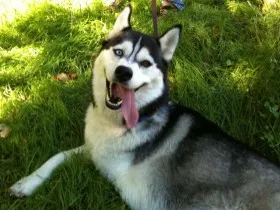 Siberian Husky Shania resting on grass, with a goofy grin, and her big tongue hanging out.
Siberian Husky Shania resting on grass, with a goofy grin, and her big tongue hanging out.
3. Breed Suggestions for a Shiba Inu Companion
While individual temperament is key, some breeds are often cited as good matches for Shibas due to similar energy levels or complementary personalities.
- Siberian Husky: As mentioned, their affection and less dominant nature can work well. They also have comparable energy levels for joint activities.
- Akita Inu: While also Japanese, Akitas share some traits with Shibas, like loyalty and a strong personality. However, their size and intensity might require careful consideration and introduction.
- Other Spitz-type breeds: Dogs like the Finnish Spitz or Norwegian Elkhound share a similar heritage and can sometimes have compatible temperaments, though research into each breed’s specific traits is essential.
- Friendly, adaptable breeds: Breeds known for their amiable nature and adaptability, such as Golden Retrievers or Labrador Retrievers, could also be suitable if their energy levels can be managed and they are introduced carefully. These breeds can often adapt to different play styles and temperaments.
Ultimately, the best companion dog for Shiba Inu is one that has been carefully assessed for compatibility, not just based on breed, but on individual personality and behavior.
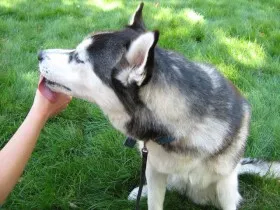 Siberian Husky Shania doing a sit, and licking the hand that feeds her. Reward training.
Siberian Husky Shania doing a sit, and licking the hand that feeds her. Reward training.
The Introduction Process
Meeting and greeting potential companions on neutral territory is crucial. Avoid bringing a new dog directly into your Shiba’s home turf initially. Have handlers remain calm and observe the dogs’ body language. Walks on leash at a comfortable distance, gradually decreasing the space, can help them acclimate. Never force an interaction if signs of stress or aggression are present. Testing the new dog in your home for a trial period, if possible through breeders or rescue organizations, is highly recommended. This allows you to see firsthand how they interact with your Shiba Inu in their environment.
When introducing the new dog into the home, focus on creating positive experiences for both dogs. Group obedience training sessions where they work together can build positive associations. Consistent and fair rules, along with equitable distribution of affection and attention, are vital. Ensure the new puppy doesn’t constantly disturb your Shiba’s rest time, and supervise interactions to prevent resource guarding or stealing, which could lead to aggression.
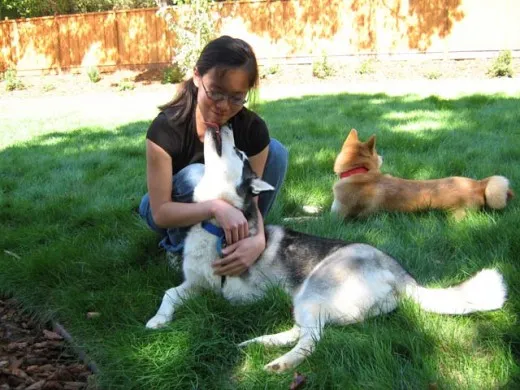 Siberian Husky licking girl on chin and doing chin nibbles.
Siberian Husky licking girl on chin and doing chin nibbles.
Finding the best companion dog for Shiba Inu is a journey that prioritizes understanding your Shiba’s unique personality and seeking a canine friend who can integrate harmoniously. With careful selection, patient introduction, and consistent management, you can successfully expand your canine family.
